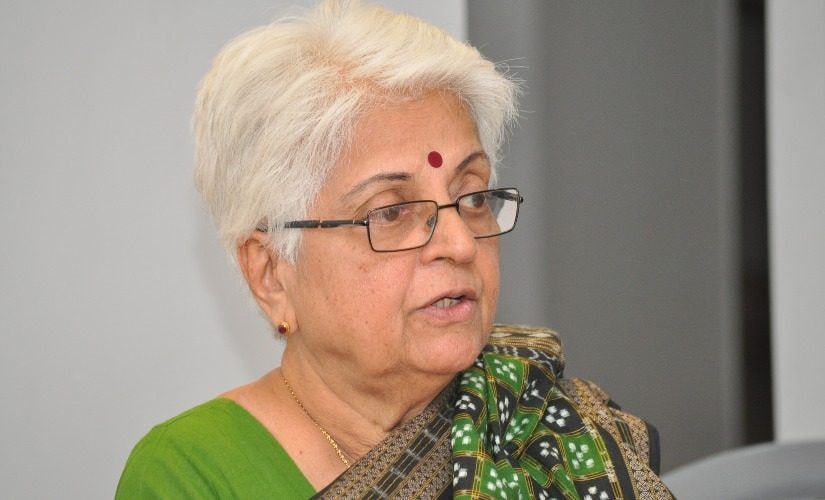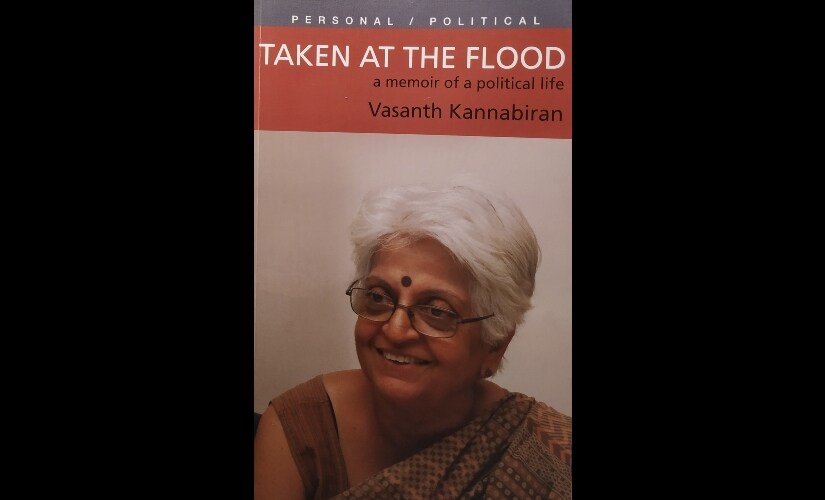I walk into her house where she is dressed in a kalamkari sari with a blouse in a contrasting colour — a mix I have seen for the many years I have known her. As I push open the door that is never shut, I look at the popular photograph of her and Kannabiran hanging on the wall — the photograph taken at Guttikondabilam, an incident she narrates in her memoir, Taken At The Flood. She welcomes me with a warm smile, and we begin talking about her life. Vasanth Kannabiran is a well known name in the Indian women’s movement. She has helped build several women’s rights organisations and has been part of India’s modern feminist history. She narrates in her book the battles fought by civil society: some across the country, some in the states where she spent most of her life. The book analyses and reflects on the victories we’ve enjoyed thus far in the women’s movement, and the leaps and bounds we still have to travel as a community. First feminist action Feminism entered her life much later, she writes, but from early on, the signs were there. From how items were organised on a dhobi’s list (men’s clothes to women’s) which upset her, to challenging the status quo of only male representatives in colleges. When college elections were around the corner, she realised that women had to be satisfied with a post that was reserved for them. Defying these protocols, she and a few of her friends nominated a woman for the position of president. Back then, she believes, “it was just a reaction, pure and simple". [caption id=“attachment_8088741” align=“alignnone” width=“825”]  There’s no women’s liberation without a revolution and there is no revolution without women, Vasanth writes[/caption] Their actions led to weeks of harassment in the form of obscene photographs and subsequent reluctance from the administration to take a stand. Till, of course, the women of the college rebelled and refused to attend an event. Recounting this incident, Vasanth says, “The brilliant threat to boycott must have been the Communist heritage. I never really discussed or mentioned this at home. Hindsight tells me it was feminist and brilliant.” As a reader and a feminist, Taken At The Flood was a humbling book. A reminder of what generations of women before me (before us?) have had to do, from challenging how a dhobi writes his list to being subjected to lewd photos or comments when they dissent. Her memoir, like her life, had intersecting realities. She was also immersed in the communal tensions of the 1980s in Hyderabad, under the banner of Hyderabad Ekta. Of the riots relief work, she writes, “It was the bitter truth that the minute there was a riot and bloodshed in the city, men between the ages of 15 and 70 were rounded up by the police and put behind bars.” Vasanth says, “Events become historical with time. The realisation that they were significant kept dawning on me only as I sat down to write. But all I was doing was telling a story, the story of my life.” For readers, there is a resonance of the same patterns we see even today. As a part of the women’s movement, Vasanth writes about the shifts in the issues that were focussed on, and how this changed the contours of the movement itself. She speaks about how the movement shaped her: “Where did the desire or the confidence to want something come from, if not from the women’s movement?” She reflects on the divisions that arose and how women grappled with them. She writes: “What a long way we have come since then, and how little we realised at that time, that we had miles to go. That those dark and deep woods would unravel so many truths we had taken for granted. (…) How our perceptions and assumptions about secularism could completely exclude and alienate women.” [caption id=“attachment_8088751” align=“alignnone” width=“825”]  Reading Taken at the Flood is a beautiful reminder of the long historical battle women have had with public protests[/caption] As we sit in her house and discuss women’s history, she speaks about the public-private divide of women’s lives. The demand for women to stay home, look after children, be domesticated and not have too many opinions — all remain relevant today. The pushback women are subjected to each time they come together is all too well-known and familiar; our collective history shows us that women have challenged this divide for decades.
She writes: “There’s no women’s liberation without a revolution and there is no revolution without women.
That is what the Maoists also declared during the peace talks in the 2000s. And no one but feminists can understand the implications of this statement, that sexuality is the key to both oppression and liberation, a lesson that mankind will take forever to learn.” From then to now: What has changed? Women pouring out of homes and onto streets when needed is not new for India. During the freedom movement, women like Acchamamba and Durga Bai and many others came out onto the streets. This was of course also true for the anti-arrack struggle in Andhra Pradesh (united) that brought down a government, the uproar after Rameeza Bee’s gang rape that led to police firings and curfews, the mothers of Manipur who have resisted, the women of Kashmir standing their ground in the face of brutal violence, and now again, in the wake of the protests against the proposed National Register of Citizens (NRC), the National Population Register (NPR) and the Citizenship (Amendment) Act (CAA). In this interview, Vasanth spoke about how the women of Shaheen Bagh have decimated so many stereotypes: “These women have shattered the myth of the oppressed Muslim woman who needs to be saved. They have marched in to save the country, save our freedoms and rebuild our future.” There has been an outpouring of criticism from people who believe these women should not have brought their children to the protest, after news of the death of a child broke out (the child died due to the cold). The implication is that women, yet again, must choose between being good mothers or fighting for social justice. Commenting on the power of the personal, Vasanth says, “Women have shown us that they can rise above these comments and be seen and heard by the whole world. They are saying with their presence that this oppression will not be lived down.” Reading Taken at the Flood is a beautiful reminder of the long historical battle women have had with public protests right from Rameeza Bee, to challenging how rape is understood in the aftermath of the alleged rape of a tribal girl by two policemen in Mathura in 1972, to present-day violence in our country. She talks about the “steady mobilisation and a struggle against family violence and dowry deaths” that took place in those early years when “networking between groups across the country (no emails or cell phones then) was hard but it grew steadily around Mathura’s rape.” The book is a must-read for feminists of all generations; it is important for us to reflect on the past and rebuild our futures with empathy. In the chapter on the women’s movement, Vasanth writes: “To be able to do what you believe in, and enjoy doing it, is one of the perks of being part of the women’s movement — or any movement for that matter.” Of course, the movement is forever changing and forever adapting and “the simplistic assumptions of the unity and uniformity of women’s oppression have been dissolved into newly emerging identities and differing needs.” In the end, what did I gain from reading this book? A reminder of our shared feminist history; the barriers that women have been nudging throughout history; that our personal is indeed political; that to win this fight against our varied and differing oppressors, we need to come together: women as pillars of the revolution. Srinidhi Raghavan is a writer, researcher and trainer. She works at the intersections of sexuality, gender, disability and technology. She works on programme development with Rising Flame and is the Co-Founder of The Curio-city Collective.


)
)
)
)
)
)
)
)
)



